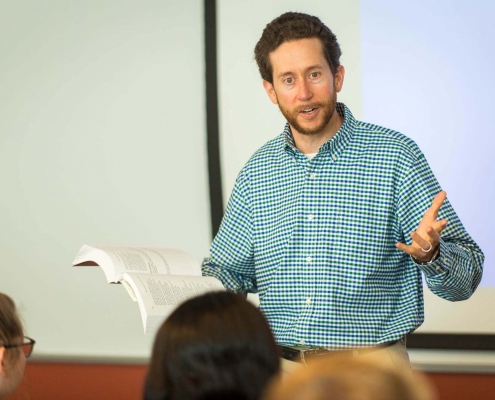Building Bridges of Understanding
Written by Laurie Gauger-Hested
Building bridges seems to be a theme in the life and ministry of Dr. Ryan MacPherson, a new member of MLC’s graduate faculty.
 Dr. MacPherson is teaching two courses in our new Master of Arts in Theological Studies program: Creation Apologetics and Bioethics. Both courses have an underlying goal: building bridges of understanding with those who disagree with us, including unbelievers and skeptics, those who give pride of place to “the ever-changing winds of science” instead of the unchanging Word of God. We’ll let him explain:
Dr. MacPherson is teaching two courses in our new Master of Arts in Theological Studies program: Creation Apologetics and Bioethics. Both courses have an underlying goal: building bridges of understanding with those who disagree with us, including unbelievers and skeptics, those who give pride of place to “the ever-changing winds of science” instead of the unchanging Word of God. We’ll let him explain:
CREATION APOLOGETICS
“Creation Apologetics examines the nature of science and evaluates debates between creation and evolution, both historical and present-day. If you are looking for a quick five-point formula to memorize and deploy against every evolutionist you’ll ever meet, that’s really not possible. Instead, we will take a step back, read through the Bible, the Lutheran Confessions, and our hymnal to review what the doctrine of creation is and why it matters.
“Meanwhile, we’ll learn about logical fallacies as compared to sound reasoning, and evaluate the arguments presented by both creationists and evolutionists.
“The result will be a comprehensive perspective on the creation/evolution debate, thoroughly grounded in distinctive Lutheran principles, such as the ministerial use of reason vs. the magisterial misuse of reason.
“The capstone project for the course involves each student articulating a confessional Lutheran approach to creation apologetics and then applying it to a particular example—intelligent design theory, the age of the earth, or whatever.
“My hope is to provide students with a broad foundation in biblical creationism and Lutheran apologetics so that they are ready to equip others whom they serve to stand firm amid the ever changing winds of science surrounding the doctrine of creation.
BIOETHICS
“Bioethics similarly will provide a broad theological foundation from which to address particular issues of current controversy. ‘Bioethics’ used to mean mostly the abortion debate and the euthanasia debate, perhaps with some discussion of organ donation along the way. Now homosexuality and transgenderism need to be addressed as well as controversies over mandatory vaccination and a host of other issues.
“Utilitarian agendas and postmodern individualism shape the public discourse in ways that profoundly influence the church; Christians, therefore, need to return to the biblical revelation of God’s moral standards as well as appeal to God’s gift of natural law when building bridges of understanding with unbelievers.
“We also need biblical wisdom to know when we have clear answers and when God’s Word leaves a question open. Above all, we need gospel comfort!”
Dr. MacPherson has taught a similar course to pre-med and nursing students at Bethany Lutheran College for many years. He finds that BLC students enjoy examining and comparing the worldly philosophies that drive our culture and the timeless truths we find in Scripture. He looks forward to sharing his expertise with MLC course participants as well, realizing that our graduate students are mostly teachers and staff ministers who will have their own ministry experiences and insights to share.
MacPhersons’s penchant for examining the world and building bridges of understanding began early. Always a curious child, always asking Why? and How? he was dubbed “the professor” by his parents.
After graduating from Arizona Lutheran Academy, he earned degrees at Bethany Lutheran College (AA), Arizona State University (BA-Integrative Studies), and University of Notre Dame (PhD-History and Philosophy of Science). He also has completed partial course work toward an MDiv at Bethany Lutheran Theological Seminary.
He’s served on the faculty of Bethany Lutheran College since 2003, chairing the history department and teaching U.S. history survey courses, introductory philosophy courses, and upper-division courses in the areas of Supreme Court history, the Civil Rights Movement, the history of science, and bioethics.
“I like to look at things from multiple points of view and understand what makes people disagree, and then I think about how I might help people understand each other better,” he says. “I enjoy seeing the gleam in a student’s eye when the ah-hah moment kicks in. Most of all, I delight in the wisdom that God’s Word brings to bear on so many different topics. I can’t help but to view things through the lens of Christian theology, and I want my students to develop a biblical worldview too.”
——-
Professional memberships:
- ELS Committee on Apologetics
- Ruth Institute Circle of Experts
- Former ELS Historical Society Board of Directors (nine years)
Published books and periodicals:
- Senior editor: The Family in America: A Journal of Public Policy (2012-2016)
- Editor: Telling the Next Generation: Essays concerning the Significance of Christian Education in the Evangelical Lutheran Synod, 1918-2011 and Beyond (Mankato MN: Evangelical Lutheran Synod, 2011), winner of Concordia Historical Society’s Award of Commendation
- Author: Debating Evolution before Darwinism: An Exploration of Science and Religion in America, 1844–1859 (Mankato MN: Into Your Hands, 2015).
- Author: Rediscovering the American Republic: Biographies, Primary Texts, Charts, and Study Questions—Exploring a People’s Quest for Ordered Liberty; Volume 1: 1492–1877 (Mankato MN: Into Your Hands, 2012; 2d ed., 2018); Volume 2: 1877–Present (2013).
- Author: The Culture of Life: Ten Essential Principles for Christian Bioethics (Mankato MN: The Hausvater Project, 2012).
- Author: Studying Luther’s Large Catechism: A Workbook for Christian Discipleship (Mankato MN: The Hausvater Project, 2012).
Family: Ryan and his wife, Marie, belong to Mt. Olive-Mankato, Minnesota, and homeschool their six children. They share Lutheran marriage and parenting resources on the Hausvater Project website (hausvater.org), Hausvater referring to Luther’s directive that “housefathers” teach the Word of God at home.
Favorite books: Gene Veith’s God at Work, Randy Alcorn’s books: “He’s not Lutheran,” MacPherson says, “but he takes the sola scriptura principle seriously. I aim to be a good Berean while reading a variety of Christian authors.”
Personal interests: reading the Bible in Greek and Hebrew, discussing books with his wife, teaching Latin to his children, reading to his children (Matthew Christian Harding’s Peleg Chronicles, Avi’s Crispin, Eric Kelly’s The Trumpeter of Krakow, C.S. Lewis’s Narnia series), hiking and riding bike with his family, doing DIY plumbing and electrical work at home





